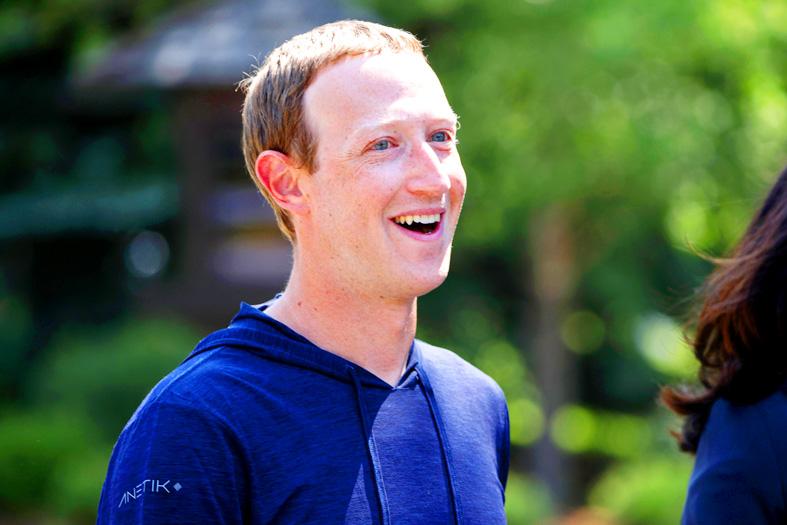Three Australian publishers of lifestyle content say Facebook Inc used their articles on its just-launched news service after refusing to negotiate licensing deals, and that the country’s tough new Internet law has failed to protect them.
Australia this year passed a law that pressured Facebook and Alphabet Inc’s Google to sign deals with some of the country’s biggest news companies by threatening government intervention.
The dispute highlights possible shortcomings in the controversial law. While most of Australia’s main media firms have signed deals, some smaller outlets say the law has not stopped their content generating clicks and advertising revenue for Facebook without compensation.

Photo: AFP
Broadsheet Media, Urban List and Concrete Playground, Web sites which publish entertainment news, reviews and listings, say that after the law was passed in February they approached the social media giant about payment for their content.
Facebook knocked them back, calling their content unsuitable for its Facebook News platform and recommending they apply for grants it was offering from a A$15 million (US$11.04 million) fund for Australian regional and digital newsrooms, the three companies said.
“They told me that: ‘Oh well, you’re not going to be included in News tab and that’s what we’re paying for,’” Broadsheet Media founder Nick Shelton said. “To our surprise, we woke one morning last week and all of our content was there.”
Facebook News went live in Australia on Wednesday last week.
Facebook declined to comment directly on the three companies, but said that it created value for publishers by sending viewers to their sites.
Under the law, Facebook and Google must negotiate payment deals with outlets or a government-appointed arbitrator will do it for them, but a publisher must first prove its primary purpose is producing news and that it has been unfairly disqualified.
The three publishers said they want Facebook to come to the table to talk, but if it declined they might seek government intervention.
“If at the end of the day we don’t get included in a commercial agreement, then absolutely they need a stick,” Shelton said. “We are three prime examples of publishers and media businesses which should be included as part of this framework.”
To be covered by the law, publishers must register as a news provider with the Australian Communications and Media Authority “based on criteria including the levels of ‘core news’ [essentially public interest journalism] that they produce,” the Australian Competition and Consumer Commission, which drafted the law, said in an e-mail.
Urban List has registered on the list. Broadsheet and Concrete Playground have yet to register, saying they want to hold out for a private deal.
Tama Leaver, a professor of Internet studies at Curtin University in Perth, said that while Facebook had not broken the law as the matter was not yet before arbitration, its apparent treatment of the three publishers was “extremely poor practice, disingenuous and further disadvantages the smaller players in the news business arena.”
In a separate dispute, the commission has said it would look into a claim by The Conversation, which publishes current affairs commentary by academics, that Facebook has refused to negotiate a licensing deal. The Conversation has secured a deal with Google.

CHIP WAR: Tariffs on Taiwanese chips would prompt companies to move their factories, but not necessarily to the US, unleashing a ‘global cross-sector tariff war’ US President Donald Trump would “shoot himself in the foot” if he follows through on his recent pledge to impose higher tariffs on Taiwanese and other foreign semiconductors entering the US, analysts said. Trump’s plans to raise tariffs on chips manufactured in Taiwan to as high as 100 percent would backfire, macroeconomist Henry Wu (吳嘉隆) said. He would “shoot himself in the foot,” Wu said on Saturday, as such economic measures would lead Taiwanese chip suppliers to pass on additional costs to their US clients and consumers, and ultimately cause another wave of inflation. Trump has claimed that Taiwan took up to

A start-up in Mexico is trying to help get a handle on one coastal city’s plastic waste problem by converting it into gasoline, diesel and other fuels. With less than 10 percent of the world’s plastics being recycled, Petgas’ idea is that rather than letting discarded plastic become waste, it can become productive again as fuel. Petgas developed a machine in the port city of Boca del Rio that uses pyrolysis, a thermodynamic process that heats plastics in the absence of oxygen, breaking it down to produce gasoline, diesel, kerosene, paraffin and coke. Petgas chief technology officer Carlos Parraguirre Diaz said that in

SUPPORT: The government said it would help firms deal with supply disruptions, after Trump signed orders imposing tariffs of 25 percent on imports from Canada and Mexico The government pledged to help companies with operations in Mexico, such as iPhone assembler Hon Hai Precision Industry Co (鴻海精密), also known as Foxconn Technology Group (富士康科技集團), shift production lines and investment if needed to deal with higher US tariffs. The Ministry of Economic Affairs yesterday announced measures to help local firms cope with the US tariff increases on Canada, Mexico, China and other potential areas. The ministry said that it would establish an investment and trade service center in the US to help Taiwanese firms assess the investment environment in different US states, plan supply chain relocation strategies and

Japan intends to closely monitor the impact on its currency of US President Donald Trump’s new tariffs and is worried about the international fallout from the trade imposts, Japanese Minister of Finance Katsunobu Kato said. “We need to carefully see how the exchange rate and other factors will be affected and what form US monetary policy will take in the future,” Kato said yesterday in an interview with Fuji Television. Japan is very concerned about how the tariffs might impact the global economy, he added. Kato spoke as nations and firms brace for potential repercussions after Trump unleashed the first salvo of